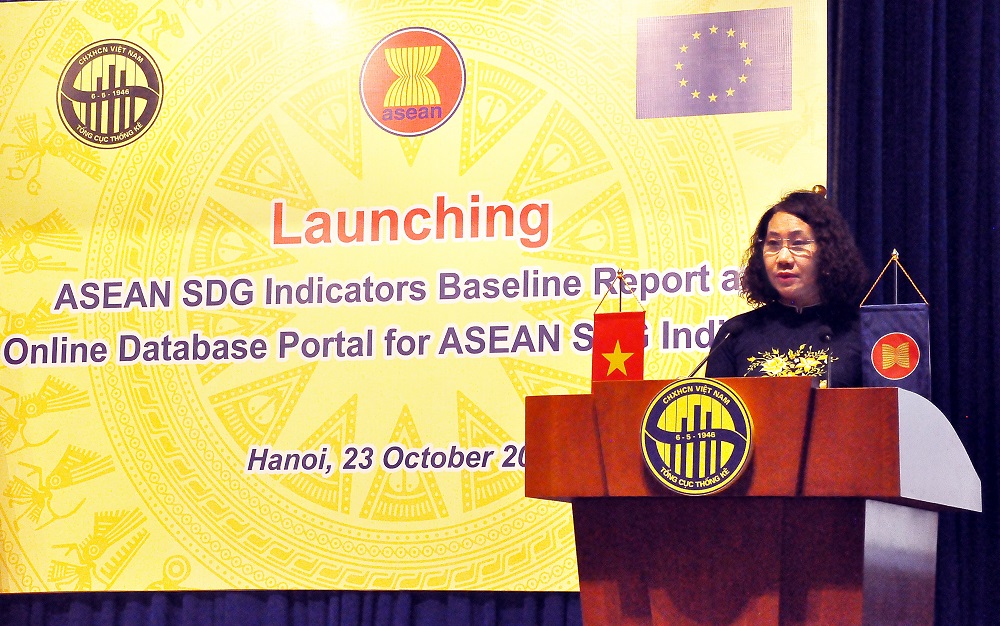In
the morning of October 23rd, 2020, the General Statistics Office
(GSO) cooperated with the ASEAN Statistics Division (ASEANStats) and the
ARISEplus Project to hold Launching ASAN SDG indicators baseline report and
online database portal for ASEAN SDG indicators.
Attending
the online launching, at Vietnam’s side, there were General Director of GSO -
Dr. Nguyen Thi Huong, Deputy General Directors; Leaders and senior
statisticians of units under GSO; representatives of ministries, branches,
international organizations and press agencies in Hanoi. At international sides,
participants were Dr. Julia Tijaja, Director of ASEAN Integration Monitoring
Department, ASEAN Secretariat; Mr. Igor Driesmans, Ambassador of the European
Union to ASEAN; ARISEplus project; representatives of national statistical office
of ASEAN member states, the Working Group on sustainable development goal indicators
(WGSDGI), the Statistics Division and some ASEAN Departments and bodies;
international organizations such as UNESCAP, FAO, ILO, UNFPA, ADB, Eurostats,
IMF. Mr Anang Laksono, high-level statistician of ASEANstats, was the moderator
of this launching.

Delivering the remark, Ms. Nguyen Thi Huong emphasized that
being chair of ASEAN for Statistics 2020, Vietnam proposed the initiative
"Establishing the statistical information system on sustainable
development of ASEAN” and received consensus, active participation to implement
this initiative of member states. The initiative aims to contribute to establish
a sustainable, uniform and consistent statistical information system; ensure to
adequately provide information on monitoring and evaluation of ASEAN
sustainable development; simultaneously promote partnerships, improve capacity of
member countries to collect and compile SDG indicators as well as strengthen
the role of coordination of ASEANstats. With ASEANstats’ proactive, efforts of
member states and the active support of ARISEplus, the baseline report and the online
database of ASEAN SDGs have been developed and completed to specify the above
Initiative.

Dr.
Julia Tijaja stated that the ASEAN Community's vision to 2025 has complemented
the UN Agenda 2030 for Sustainable Development with efforts to improve the
living standards of people in the ASEAN community. This is reflected in the
Blueprint 2025 of the ASEAN Economic Community and Socio-Cultural Community,
which is committed to achieving sustainable socio-economic development of
ASEAN. Mr. Igor Driesmans appreciated the baseline report, emphasized that SDG indicators play an important role in making
policies for sustainable development, green growth of member countries, and
being an important tool to ensure transparency of statistical indicators.
After the opening session, participants listened to Mr.
Tang Hsiu Chin, Chairman of the WGSDGI group of ASEAN, introduce the baseline report
and Mr. Sueka Putra, ASEANstats, introduced the online database of ASEAN SDG
indicators. The baseline report with 67 indicators and the online database
portal with 134 indicators are one of commitments of the ASEAN Community
Statistics System (ACSS) to provide relevant, timely, comparable statistics to
serve making evidence-based policy of ASEAN member countries.
In
order to improve the availability and quality of SDG indicators, ACSS committed
to continue to build capacity and strengthen cooperation within the region and among
ASEAN countries through the implementation of activities in accordance with
strategy, priority and work plan on SDG. This is to ensure that ACSS will
always grasp and understand statistical needs of relevant agencies, especially
ASEAN agencies and departments.

The
ceremony spent 20 minutes on discussing SDG indicators with participation of
WGSDGI, ASEANstats and experts ARISEplus.
To
ensure monitoring and evaluation sustainable development goals of ASEAN to
2030, Vietnam proposes a number of contents: (1) maintaining and promoting the
initiative of WGSDGI; (2) member countries regularly update SDG indicators; (3)
mobilize and enlist active support of international organizations, development
partners, NGOs, business community and society as a whole in SDG monitoring and
evaluation.
Documents related